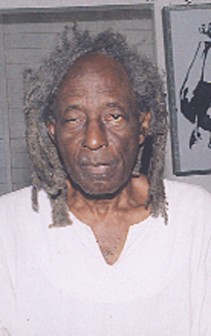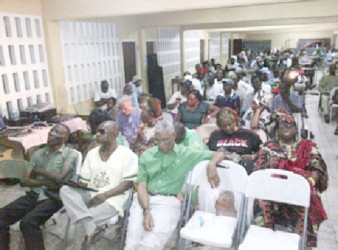In the midst of an outpouring of tributes for his contributions to Guyana’s political, social and cultural landscape, elder statesman Eusi Kwayana on Wednesday called for action to improve the way women are being treated in the society.
“Something must be done to improve the way our women are being treated,” Kwayana said on Wednesday at a tribute and symposium organised in recognition of his contributions to Guyana’s political, social and cultural landscape. “They are mothers of the human race and deserve to be treated with respect,” he added.

His call comes following a recent surge in violent attacks in which women and their children have been disfigured, maimed or killed by partners.
The symposium was organised by the First of August Movement in collaboration with the Toucan II Multi-Purpose Club. The four- hour event was full of thanks, appreciations, and acknowledgement to Kwayana, who was described as not just a politician, but also a poet, a historian, a journalist, writer, and much more.
A survey of the bottom flat of the Friendship Primary School, where the event was held, was evidence that Kwayana, who gave much of his life in formal and informal service to the Guyanese people, had garnered respect from political and civil society groups across the political, cultural and social spectrums.
The Red Thread women’s group was one of the many groups represented at the tribute, since Kwayana has always advocated for women to be treated with the highest respect. Desmond Trotman, who along with Rupert Roopnaraine represented the Working People’s Alliance (WPA) on Wednesday, said that Kwayana shows just as much zeal for service today as he did when he first began to serve the public. He voiced his conviction that Kwayana was instrumental in sparking and maintaining a national dialogue on women’s rights.
Andaiye, co-founder and international coordinator of Red Thread, shared Trotman’s sentiments on this matter. Recalling her earliest experiences with Kwayana, she remembered him as a man who always knew what needed to be done, and went beyond the point of exhaustion to do it. Noting his deep appreciation of women, she cited a plethora of poems and plays written by Kwayana which lauded women, and called for them to be treated with respect and dignity. It is no surprise therefore, that he has always been in support of legislation which benefits women.
Andaiye also saw him as one of the most politically astute persons she has ever met. This quality, Andaiye confessed, enabled him to read between the lines of politics to see what many others could not. For all of his accomplishments, however, she conceded that he was not perfect.
‘Shock’
Though he now resides overseas, Kwayana joined the gathering via Skype. Kwayana confessed that he was not fond of being praised, but thanked the organisers for the tribute. He also noted that when he was informed of the organisations’ intention to honour him, he was in “shock,” especially since the prevailing practice is to honour persons who would have passed on.
Pronouncing on a few matters, he took the opportunity to remind the generous gathering of attendees of the importance of having organised communities, and celebrating the historical significance of those communities. He suggested that a village festival for each village be held on their anniversary every year.
Notable at the symposium was the fact that representatives of the People’s National Congress Reform (PNCR), the WPA, and the People’s Progressive Party/Civic (PPP/C), all attended the event to pay their to Kwayana and recognise the positive gains he afforded the three parties.

In fact, Kwayana wrote the lyrics for the battle songs of each party—lyrics which have remain unchanged over the decades.
David Granger, who attended the tribute in his capacity as PNC leader, when invited to speak, gave a brief overview of Kwayana’s political career. According to Granger, Kwayana, in his early political career, was an avid supporter of Cheddi Jagan who, partially as a result of Kwayana’s campaigning, was able to secure a seat in the Legislative Council. Later, when Jagan and Forbes Burnham formed the PPP with intentions of moving Guyana towards independence, Kwayana, believing in the ideals of Jagan, also became a member of the movement and even served as its Assistant General Secretary as well as the Minister of Works after the 1953 elections.
Even after Burnham split from the party in 1955, Kwayana stayed on with Jagan, although he left a year later to join Burnham’s People’s National Congress. Kwayana served as the PNC’s General Secretary, and due to his unique approach to politics, was instrumental in improving the party’s support base.
In 1961, however, he was made to leave the party over disagreements on how the race issue was being dealt with. He continued to support the party and held a number in posts in the government until 1971, when he left over concerns about corruption.
Kwayana, after the formation of the WPA in 1974, was one of its foremost members, and was also appointed to be the party’s presidential candidate in the 1985 elections. Furthermore, he represented the party in parliament, where, according to former Finance Minister Carl Greenidge, who was also present at the symposium, he used his unique approach to politics to force the government to consider new dimensions.
Also in attendance were representatives of the African Society for Cultural Relations with Independent Africa (ASCRIA) and the African Society for Racial Equality (ASRE), organisations Kwayana co-founded and played a significant role in leading. Through these bodies, he sought to raise awareness among Africans as well as fight for the equal treatment of all of Guyana’s ethnic groups.
‘A servant leader’
Despite his leadership roles, Kwayana’s greatest leadership skill, according to African Cultural and Development Association (ACDA) Executive Director Eric Phillips, is his drive to serve. In fact, Kwayana was described by Phillips as “a servant leader who creates leaders.” This sentiment was reiterated by several of the other attendees of the functions.
One of his greatest feats of service was the establishment of Lessons Place, an initiative which allowed student to receive additional lessons instructions free of cost after school. Kwayana, who was also a teacher, eventually began offering meals to the students who attended the lessons before they left. “Students came for lessons after school every afternoon, and before they left every evening they got something to eat,” a beneficiary of Lessons Place said.
It was acknowledged that while some persons started to come just so they could benefit from the meal, many of them, nevertheless, left educated.
At the end of the function, David Hinds, one of its organisers, suggested that the Friendship Primary School be renamed the Eusi Kwayana Primary School—a suggestion that was agreed to by all who attended. Such a move, however, is insufficient to change the name of a government school.
Hinds, though, has indicated that he will commence engagements with the Ministry of Education to have the necessary steps taken.




